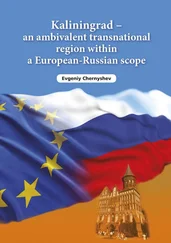It seems clear that this relationship can be at best a federal one, under which the Ukraine would enjoy a considerable measure of political and cultural autonomy but would not be economically or militarily independent. Such a relationship would be entirely just to the requirements of the Great Russians themselves, it would seem, therefore, to be along these lines that U.S. objectives with respect to the Ukraine should be framed.
It should be noted that this question has far more than just a distant future significance. Ukrainian and Great Russian elements among the Russian emigre-opposition groups are already competing vigorously for U.S. support. The manner in which we receive their competing claims may have an important influence on the development and success of the movement for political freedom among the Russians, It is essential, therefore, that we make our decision now and adhere to it consistently. And that decision should be neither a pro-Russian one nor a pro-Ukrainian one, but one which recognizes the historical geographic and economic realities involved and seeks for the Ukrainians a decent and acceptable place in the family of the traditional Russian Empire, of which they form an inextricable part.
It should be added that while, as stated above, we would not deliberately encourage Ukrainian separatism, nevertheless if an independent regime were to come into being on the territory of the Ukraine through no doing of ours, we should not oppose it outright. To do so would be to undertake an undesirable responsibility for internal Russian developments. Such a regime would be bound to be challenged eventually from the Russian side. If it were to maintain itself successfully, mat would be proof that the above analysis was wrong and that the Ukraine docs have the capacity for, and the moral right to, independent status. Our policy in the first instance should be to maintain an outward neutrality, as long as our own interests — military or otherwise — were not immediateiy affected. And only if it became clear that an undesirable deadlock was developing, we would encourage a composing of the differences along the lines of a reasonable federalism. The same would apply to any other efforts at the achievement of an independent status on the part of other Russian minorities. It is not likely that any of the other minorities could successfully maintain real independence for any length of time. However, should they attempt it (and it is quite possible that the Caucasian minorities would do this), our attitude should be the same as in the case of the Ukraine. We should be careful not to place ourselves in a position of open opposition to such attempts, which would cause us to lose permanently the sympathy of the minority in question. On the other hand, we should not commit ourselves to their support to a line of action which in the long run could probably be maintained only with our military assistance.
5. THE CHOICE OF A NEW RULING GROUP
In the event of a disintegration of Soviet power, we are certain to be faced with demands for.support on the part of the various competing political elements among the present Russian opposition groups. It will be almost impossible for us to avoid doing things which would have the effect of favoring one or another of these groups over its rivals. But a great deal will depend on ourselves, and on our concept of what we are trying to accomplish.
We have already seen that among the existing and potential opposition groups there is none which we will wish to sponsor entirely and for whose actions, if it were to obtain power in Russia, we would wish to take responsibility.
On the other hand, we must expect that vigorous efforts will be made by various groups to induce us to take measures in Russian internal affairs which will constitute a genuine commitment on our part and make it possible for political groups in Russia to continue to demand our support. In the light of these facts, it is plain then we must make a. determined effort to avoid taking responsibility for deciding who would rule Russia in the wake of a disintegration of the Soviet regime. Our best course would be to permit all the exiled elements to return to Russia as rapidly as possible and to see to it, in so far as this depends on us, that they are all given roughly equal opportunity to establish their bids for power. Our basic position must be that in the final analysis the Russian people will have to make their own choices, and that we do not intend to influence those choices. We should therefore avoid having proteges, and should try to see to it that all of the competing groups receive facilities for putting their case to the Russian people through the media of public information. It is probable that there will be violence between these groups. Even in this instance, we should not interfere unless our military interests are affected or unless there should be an attempt on the part of one group to establish its authority by large-scale and savage repression along totalitarian lines, affecting not just the opposing political leaders but the mass of the population itself.
6. THE PROBLEM OF "DE-COMMUNIZATION"
In any territory which is freed of Soviet rule, we will be faced with the problem of the human remnants of the Soviet apparatus of power.
It is probable that in the event of an orderly withdrawal of Soviet forces from present Soviet territory, the local communist party apparatus would go underground, as it did in the areas taken by the Germans during the recent war. It would then probably reemerge in part in the form of partisan bands and guerrilla forces. To this extent, the problem of dealing with it would be a relatively simple one; for we would need only to give the necessary arms and military support to whatever non-communist Russian authority might control the area and permit that authority to deal with the communist bands through the traditionally thorough procedures of Russian civil war.
A more difficult problem would be presented by minor communist party members or officials who might be uncovered and apprehended, or who might throw themselves on the mercy of our forces or of whatever Russian authority existed in the territory.
Here, again, we should refrain from taking upon ourselves the responsibility of disposing of these people or of giving direct orders to the local authorities as to how to do so. We would have a right to insist that they be disarmed and that they not come into leading positions in government unless they had given clear evidence of a genuine change of heart. Bul basically this must remain a problem for whatever Russian authority may take the place of the communist regime. We may be sure that such an authority will be more capable than we ourselves would be to judge the danger which ex-communists would present to the security of the new regime, and to dispose of them in such ways as to prevent their being harmful in the future. Our main concern should be to see that no communist regime, as such, is re-established in areas which we have once liberated and which we have decided should remain liberated from communist control. Beyond that, we should be careful not to become entangled in the problem of "de-communization."
The basic reason for this is that the political processes of Russia are strange and inscrutable. They contain nothing that is simple, and nothing that can be taken for granted. Rarely, if ever, are the colors straight black or white. The present communist apparatus of power probably embraces a large proportion of those persons who are fitted by training and inclination to take part in the processes of government, Any new regime will probably have to utilize the services of many of these people in order to be able to govern at all. Furthermore, we are incapable of assessing in each individual case the motives which have brought individuals in Russia into association with the communist movement. We are also incapable of assessing the degree to which such association will appear discreditable or criminal to other Russians, in retrospect. It would be dangerous for us to proceed on the basis of any fixed assumptions in such matters. We must always remember that to be the subject of persecution at the hands of a foreign government inevitably makes local martyrs out of persons who might otherwise only have been the objects of ridicule.
Читать дальше










